Family Health Assessment: Interview, Analysis, and Findings Report
VerifiedAdded on 2022/09/14
|10
|1967
|9
Report
AI Summary
This report presents a family health assessment conducted through interviews, focusing on understanding the family's functional health patterns based on Gordon's framework. The assessment includes questions related to health perception, nutrition, sleep, elimination, exercise, cognitive function, sensory perception, role relationships, sexuality, and coping mechanisms. The study involved a nuclear family of five members with a grandparent, parents, and two children. The assessment revealed strengths such as effective coping strategies and exercise habits, while identifying barriers like poor dietary habits in children and eyesight problems. The report also discusses the application of family system theory to address behavioral issues and promote health. The findings highlight the importance of family dynamics and the need for interventions to improve overall health outcomes. The assessment also includes the interview questionnaire as an appendix.
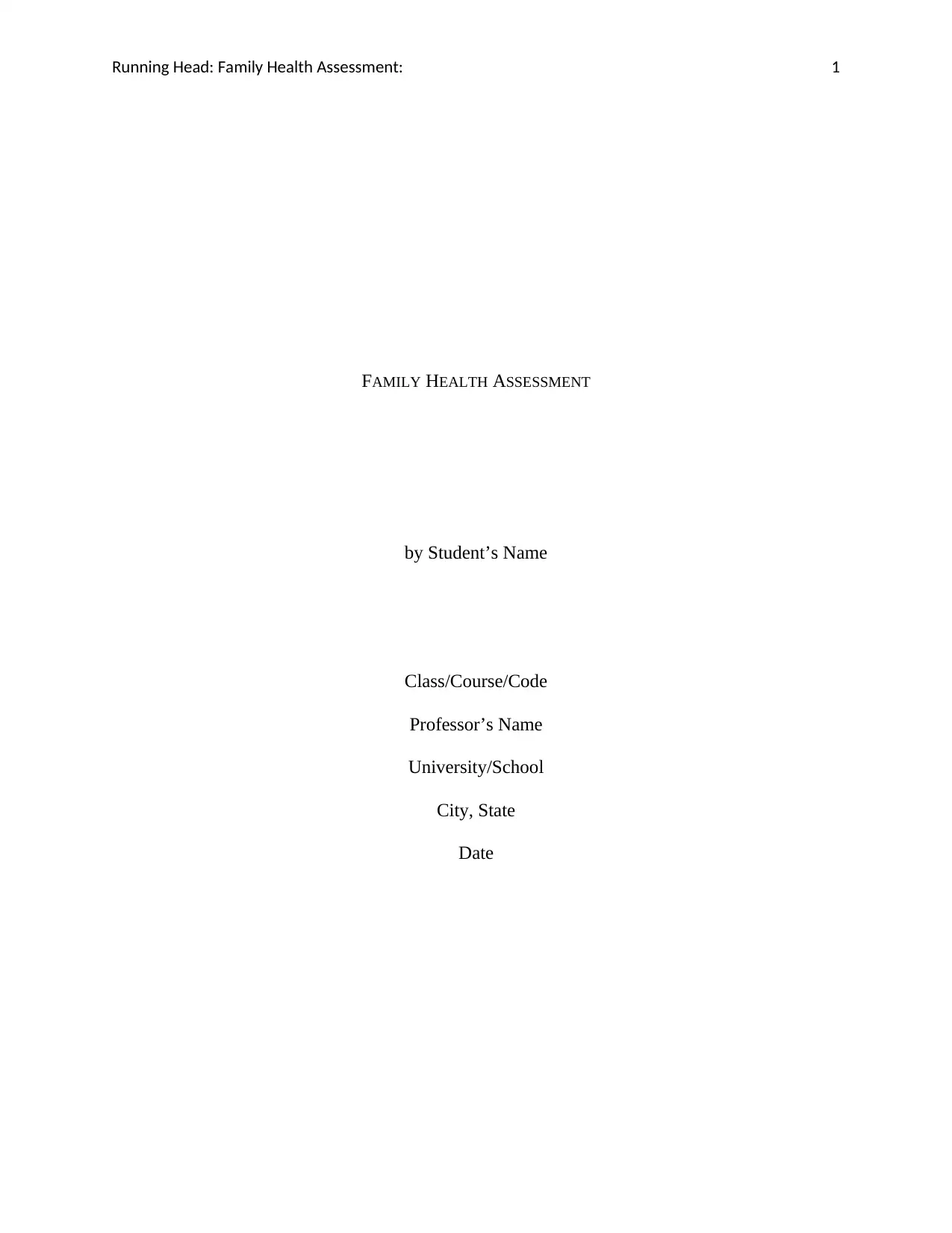
Running Head: Family Health Assessment: 1
FAMILY HEALTH ASSESSMENT
by Student’s Name
Class/Course/Code
Professor’s Name
University/School
City, State
Date
FAMILY HEALTH ASSESSMENT
by Student’s Name
Class/Course/Code
Professor’s Name
University/School
City, State
Date
Paraphrase This Document
Need a fresh take? Get an instant paraphrase of this document with our AI Paraphraser
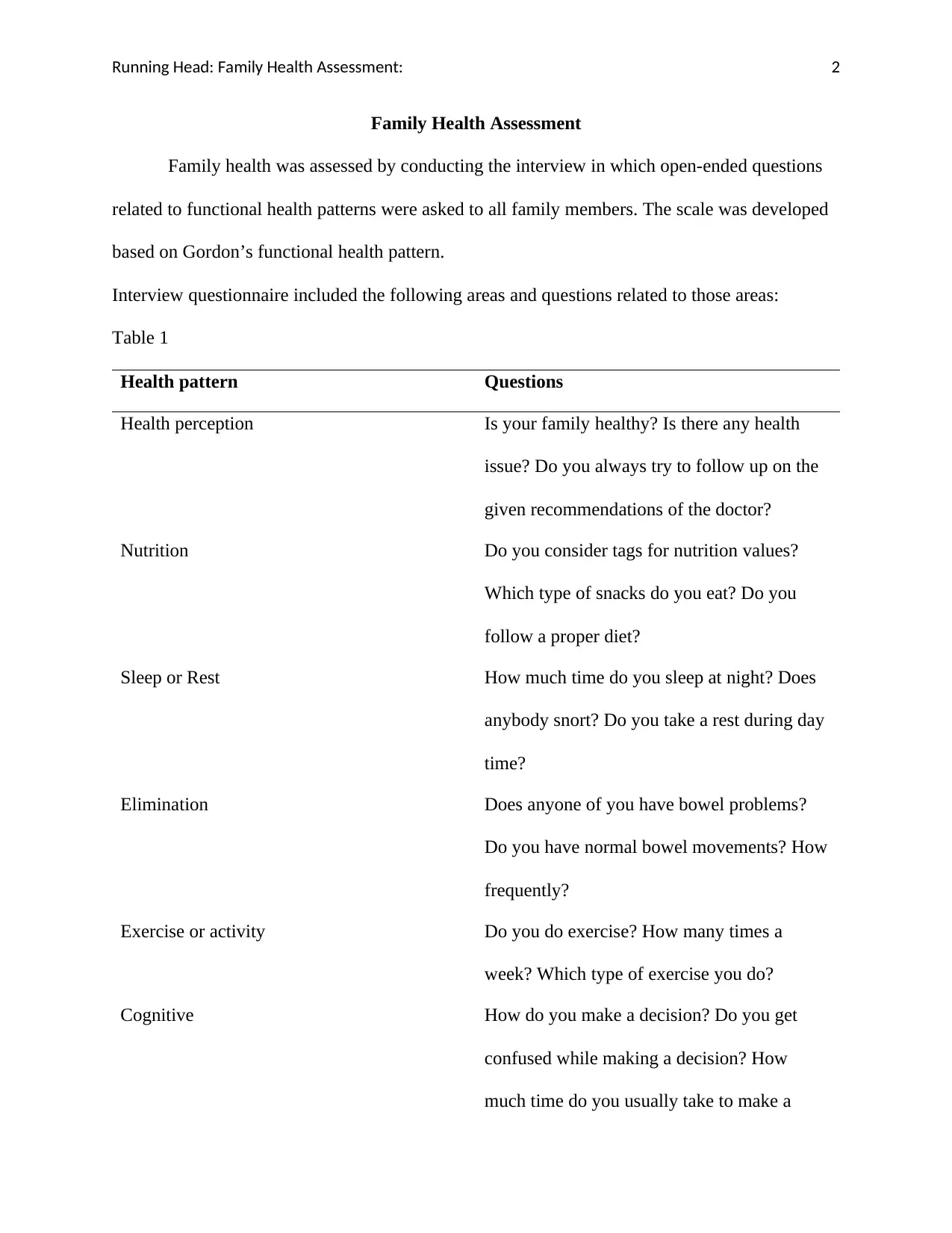
Running Head: Family Health Assessment: 2
Family Health Assessment
Family health was assessed by conducting the interview in which open-ended questions
related to functional health patterns were asked to all family members. The scale was developed
based on Gordon’s functional health pattern.
Interview questionnaire included the following areas and questions related to those areas:
Table 1
Health pattern Questions
Health perception Is your family healthy? Is there any health
issue? Do you always try to follow up on the
given recommendations of the doctor?
Nutrition Do you consider tags for nutrition values?
Which type of snacks do you eat? Do you
follow a proper diet?
Sleep or Rest How much time do you sleep at night? Does
anybody snort? Do you take a rest during day
time?
Elimination Does anyone of you have bowel problems?
Do you have normal bowel movements? How
frequently?
Exercise or activity Do you do exercise? How many times a
week? Which type of exercise you do?
Cognitive How do you make a decision? Do you get
confused while making a decision? How
much time do you usually take to make a
Family Health Assessment
Family health was assessed by conducting the interview in which open-ended questions
related to functional health patterns were asked to all family members. The scale was developed
based on Gordon’s functional health pattern.
Interview questionnaire included the following areas and questions related to those areas:
Table 1
Health pattern Questions
Health perception Is your family healthy? Is there any health
issue? Do you always try to follow up on the
given recommendations of the doctor?
Nutrition Do you consider tags for nutrition values?
Which type of snacks do you eat? Do you
follow a proper diet?
Sleep or Rest How much time do you sleep at night? Does
anybody snort? Do you take a rest during day
time?
Elimination Does anyone of you have bowel problems?
Do you have normal bowel movements? How
frequently?
Exercise or activity Do you do exercise? How many times a
week? Which type of exercise you do?
Cognitive How do you make a decision? Do you get
confused while making a decision? How
much time do you usually take to make a
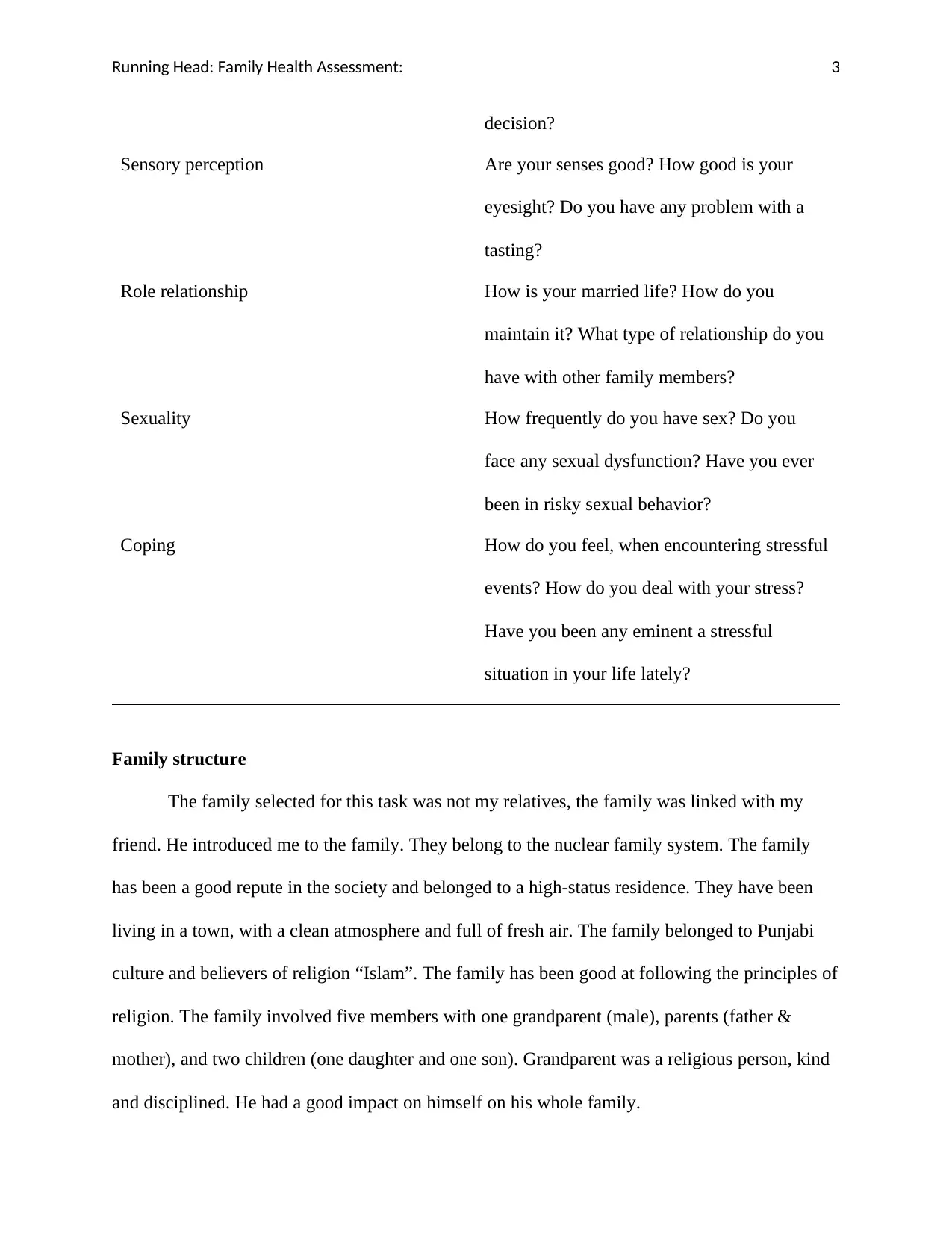
Running Head: Family Health Assessment: 3
decision?
Sensory perception Are your senses good? How good is your
eyesight? Do you have any problem with a
tasting?
Role relationship How is your married life? How do you
maintain it? What type of relationship do you
have with other family members?
Sexuality How frequently do you have sex? Do you
face any sexual dysfunction? Have you ever
been in risky sexual behavior?
Coping How do you feel, when encountering stressful
events? How do you deal with your stress?
Have you been any eminent a stressful
situation in your life lately?
Family structure
The family selected for this task was not my relatives, the family was linked with my
friend. He introduced me to the family. They belong to the nuclear family system. The family
has been a good repute in the society and belonged to a high-status residence. They have been
living in a town, with a clean atmosphere and full of fresh air. The family belonged to Punjabi
culture and believers of religion “Islam”. The family has been good at following the principles of
religion. The family involved five members with one grandparent (male), parents (father &
mother), and two children (one daughter and one son). Grandparent was a religious person, kind
and disciplined. He had a good impact on himself on his whole family.
decision?
Sensory perception Are your senses good? How good is your
eyesight? Do you have any problem with a
tasting?
Role relationship How is your married life? How do you
maintain it? What type of relationship do you
have with other family members?
Sexuality How frequently do you have sex? Do you
face any sexual dysfunction? Have you ever
been in risky sexual behavior?
Coping How do you feel, when encountering stressful
events? How do you deal with your stress?
Have you been any eminent a stressful
situation in your life lately?
Family structure
The family selected for this task was not my relatives, the family was linked with my
friend. He introduced me to the family. They belong to the nuclear family system. The family
has been a good repute in the society and belonged to a high-status residence. They have been
living in a town, with a clean atmosphere and full of fresh air. The family belonged to Punjabi
culture and believers of religion “Islam”. The family has been good at following the principles of
religion. The family involved five members with one grandparent (male), parents (father &
mother), and two children (one daughter and one son). Grandparent was a religious person, kind
and disciplined. He had a good impact on himself on his whole family.
⊘ This is a preview!⊘
Do you want full access?
Subscribe today to unlock all pages.

Trusted by 1+ million students worldwide
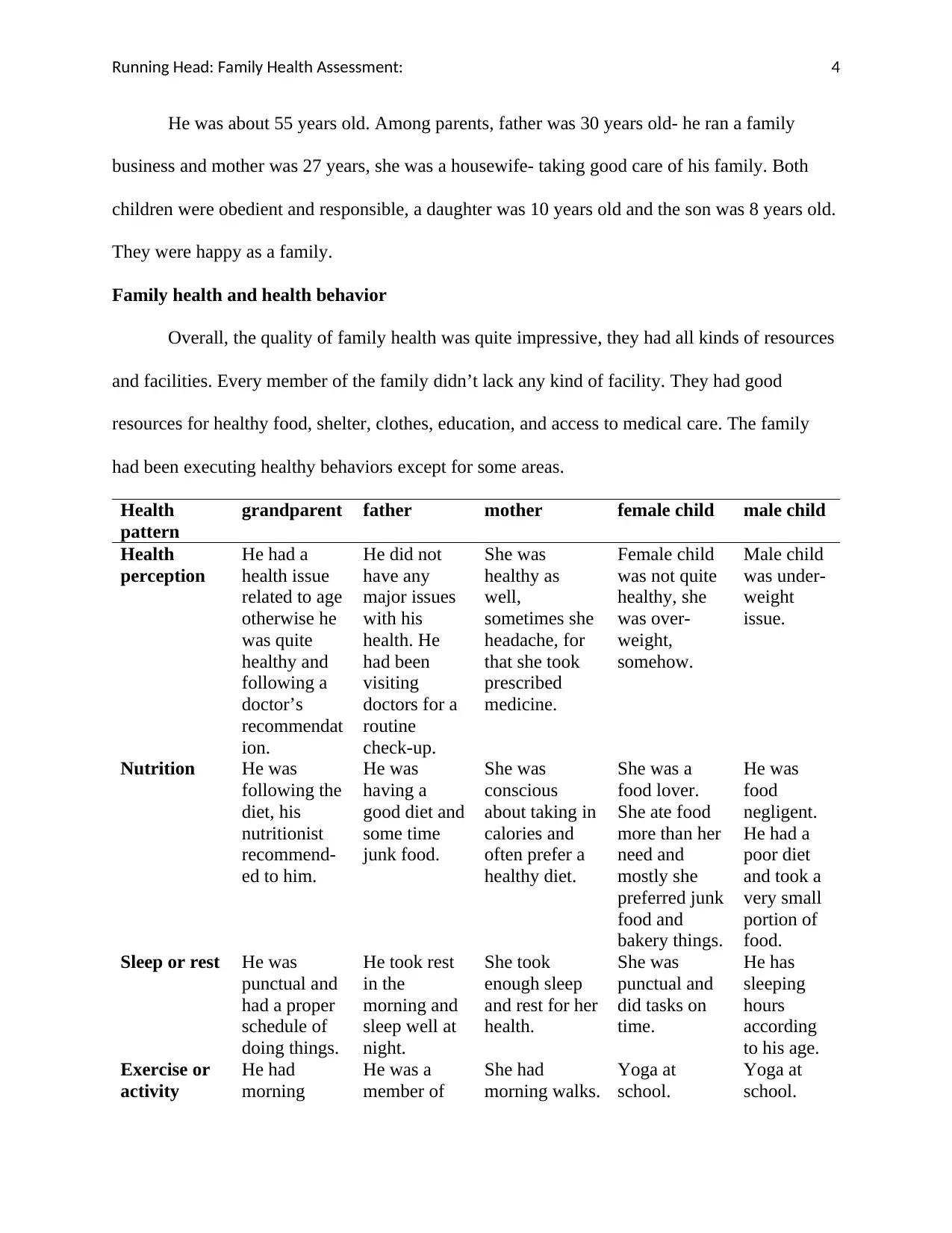
Running Head: Family Health Assessment: 4
He was about 55 years old. Among parents, father was 30 years old- he ran a family
business and mother was 27 years, she was a housewife- taking good care of his family. Both
children were obedient and responsible, a daughter was 10 years old and the son was 8 years old.
They were happy as a family.
Family health and health behavior
Overall, the quality of family health was quite impressive, they had all kinds of resources
and facilities. Every member of the family didn’t lack any kind of facility. They had good
resources for healthy food, shelter, clothes, education, and access to medical care. The family
had been executing healthy behaviors except for some areas.
Health
pattern
grandparent father mother female child male child
Health
perception
He had a
health issue
related to age
otherwise he
was quite
healthy and
following a
doctor’s
recommendat
ion.
He did not
have any
major issues
with his
health. He
had been
visiting
doctors for a
routine
check-up.
She was
healthy as
well,
sometimes she
headache, for
that she took
prescribed
medicine.
Female child
was not quite
healthy, she
was over-
weight,
somehow.
Male child
was under-
weight
issue.
Nutrition He was
following the
diet, his
nutritionist
recommend-
ed to him.
He was
having a
good diet and
some time
junk food.
She was
conscious
about taking in
calories and
often prefer a
healthy diet.
She was a
food lover.
She ate food
more than her
need and
mostly she
preferred junk
food and
bakery things.
He was
food
negligent.
He had a
poor diet
and took a
very small
portion of
food.
Sleep or rest He was
punctual and
had a proper
schedule of
doing things.
He took rest
in the
morning and
sleep well at
night.
She took
enough sleep
and rest for her
health.
She was
punctual and
did tasks on
time.
He has
sleeping
hours
according
to his age.
Exercise or
activity
He had
morning
He was a
member of
She had
morning walks.
Yoga at
school.
Yoga at
school.
He was about 55 years old. Among parents, father was 30 years old- he ran a family
business and mother was 27 years, she was a housewife- taking good care of his family. Both
children were obedient and responsible, a daughter was 10 years old and the son was 8 years old.
They were happy as a family.
Family health and health behavior
Overall, the quality of family health was quite impressive, they had all kinds of resources
and facilities. Every member of the family didn’t lack any kind of facility. They had good
resources for healthy food, shelter, clothes, education, and access to medical care. The family
had been executing healthy behaviors except for some areas.
Health
pattern
grandparent father mother female child male child
Health
perception
He had a
health issue
related to age
otherwise he
was quite
healthy and
following a
doctor’s
recommendat
ion.
He did not
have any
major issues
with his
health. He
had been
visiting
doctors for a
routine
check-up.
She was
healthy as
well,
sometimes she
headache, for
that she took
prescribed
medicine.
Female child
was not quite
healthy, she
was over-
weight,
somehow.
Male child
was under-
weight
issue.
Nutrition He was
following the
diet, his
nutritionist
recommend-
ed to him.
He was
having a
good diet and
some time
junk food.
She was
conscious
about taking in
calories and
often prefer a
healthy diet.
She was a
food lover.
She ate food
more than her
need and
mostly she
preferred junk
food and
bakery things.
He was
food
negligent.
He had a
poor diet
and took a
very small
portion of
food.
Sleep or rest He was
punctual and
had a proper
schedule of
doing things.
He took rest
in the
morning and
sleep well at
night.
She took
enough sleep
and rest for her
health.
She was
punctual and
did tasks on
time.
He has
sleeping
hours
according
to his age.
Exercise or
activity
He had
morning
He was a
member of
She had
morning walks.
Yoga at
school.
Yoga at
school.
Paraphrase This Document
Need a fresh take? Get an instant paraphrase of this document with our AI Paraphraser
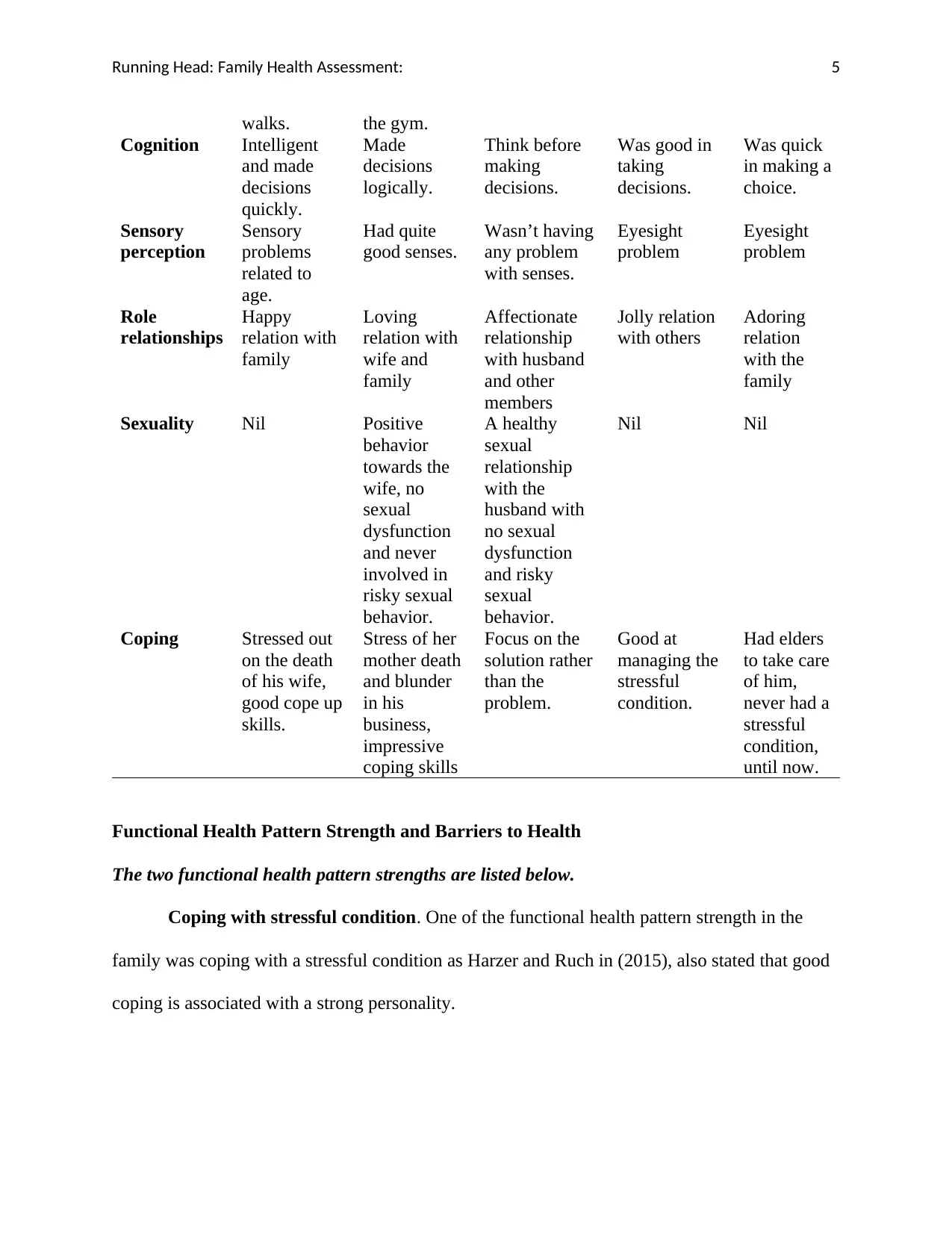
Running Head: Family Health Assessment: 5
walks. the gym.
Cognition Intelligent
and made
decisions
quickly.
Made
decisions
logically.
Think before
making
decisions.
Was good in
taking
decisions.
Was quick
in making a
choice.
Sensory
perception
Sensory
problems
related to
age.
Had quite
good senses.
Wasn’t having
any problem
with senses.
Eyesight
problem
Eyesight
problem
Role
relationships
Happy
relation with
family
Loving
relation with
wife and
family
Affectionate
relationship
with husband
and other
members
Jolly relation
with others
Adoring
relation
with the
family
Sexuality Nil Positive
behavior
towards the
wife, no
sexual
dysfunction
and never
involved in
risky sexual
behavior.
A healthy
sexual
relationship
with the
husband with
no sexual
dysfunction
and risky
sexual
behavior.
Nil Nil
Coping Stressed out
on the death
of his wife,
good cope up
skills.
Stress of her
mother death
and blunder
in his
business,
impressive
coping skills
Focus on the
solution rather
than the
problem.
Good at
managing the
stressful
condition.
Had elders
to take care
of him,
never had a
stressful
condition,
until now.
Functional Health Pattern Strength and Barriers to Health
The two functional health pattern strengths are listed below.
Coping with stressful condition. One of the functional health pattern strength in the
family was coping with a stressful condition as Harzer and Ruch in (2015), also stated that good
coping is associated with a strong personality.
walks. the gym.
Cognition Intelligent
and made
decisions
quickly.
Made
decisions
logically.
Think before
making
decisions.
Was good in
taking
decisions.
Was quick
in making a
choice.
Sensory
perception
Sensory
problems
related to
age.
Had quite
good senses.
Wasn’t having
any problem
with senses.
Eyesight
problem
Eyesight
problem
Role
relationships
Happy
relation with
family
Loving
relation with
wife and
family
Affectionate
relationship
with husband
and other
members
Jolly relation
with others
Adoring
relation
with the
family
Sexuality Nil Positive
behavior
towards the
wife, no
sexual
dysfunction
and never
involved in
risky sexual
behavior.
A healthy
sexual
relationship
with the
husband with
no sexual
dysfunction
and risky
sexual
behavior.
Nil Nil
Coping Stressed out
on the death
of his wife,
good cope up
skills.
Stress of her
mother death
and blunder
in his
business,
impressive
coping skills
Focus on the
solution rather
than the
problem.
Good at
managing the
stressful
condition.
Had elders
to take care
of him,
never had a
stressful
condition,
until now.
Functional Health Pattern Strength and Barriers to Health
The two functional health pattern strengths are listed below.
Coping with stressful condition. One of the functional health pattern strength in the
family was coping with a stressful condition as Harzer and Ruch in (2015), also stated that good
coping is associated with a strong personality.
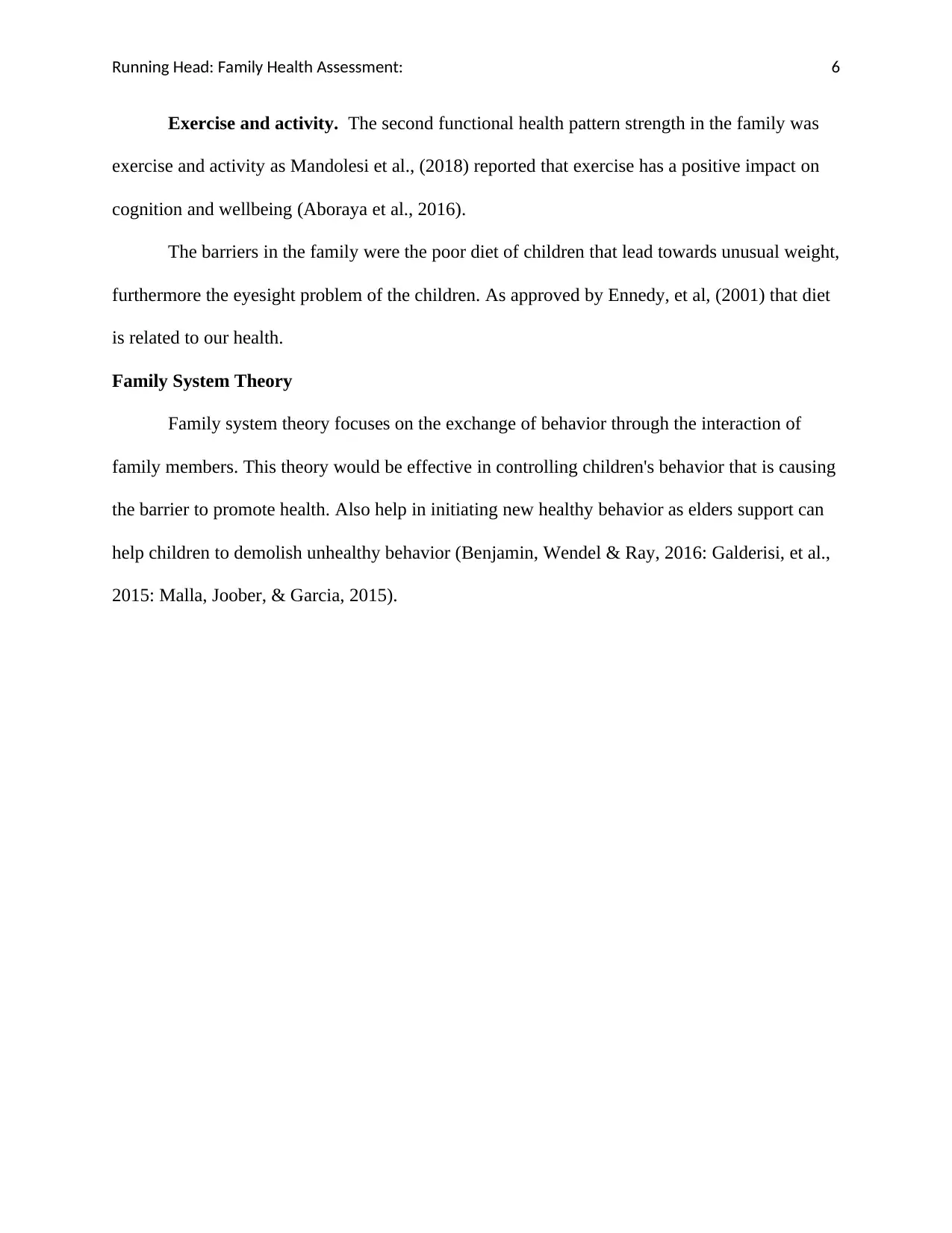
Running Head: Family Health Assessment: 6
Exercise and activity. The second functional health pattern strength in the family was
exercise and activity as Mandolesi et al., (2018) reported that exercise has a positive impact on
cognition and wellbeing (Aboraya et al., 2016).
The barriers in the family were the poor diet of children that lead towards unusual weight,
furthermore the eyesight problem of the children. As approved by Ennedy, et al, (2001) that diet
is related to our health.
Family System Theory
Family system theory focuses on the exchange of behavior through the interaction of
family members. This theory would be effective in controlling children's behavior that is causing
the barrier to promote health. Also help in initiating new healthy behavior as elders support can
help children to demolish unhealthy behavior (Benjamin, Wendel & Ray, 2016: Galderisi, et al.,
2015: Malla, Joober, & Garcia, 2015).
Exercise and activity. The second functional health pattern strength in the family was
exercise and activity as Mandolesi et al., (2018) reported that exercise has a positive impact on
cognition and wellbeing (Aboraya et al., 2016).
The barriers in the family were the poor diet of children that lead towards unusual weight,
furthermore the eyesight problem of the children. As approved by Ennedy, et al, (2001) that diet
is related to our health.
Family System Theory
Family system theory focuses on the exchange of behavior through the interaction of
family members. This theory would be effective in controlling children's behavior that is causing
the barrier to promote health. Also help in initiating new healthy behavior as elders support can
help children to demolish unhealthy behavior (Benjamin, Wendel & Ray, 2016: Galderisi, et al.,
2015: Malla, Joober, & Garcia, 2015).
⊘ This is a preview!⊘
Do you want full access?
Subscribe today to unlock all pages.

Trusted by 1+ million students worldwide
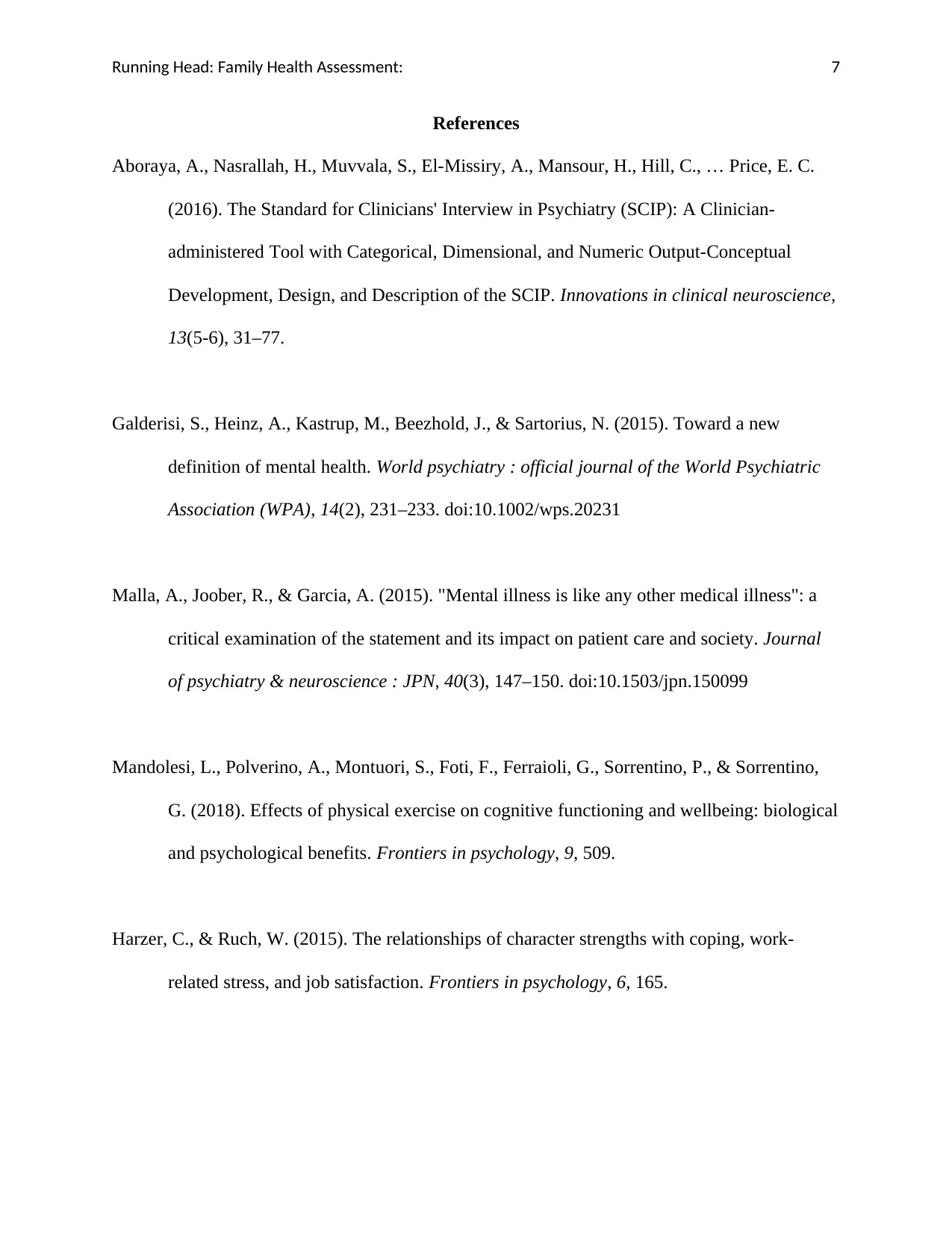
Running Head: Family Health Assessment: 7
References
Aboraya, A., Nasrallah, H., Muvvala, S., El-Missiry, A., Mansour, H., Hill, C., … Price, E. C.
(2016). The Standard for Clinicians' Interview in Psychiatry (SCIP): A Clinician-
administered Tool with Categorical, Dimensional, and Numeric Output-Conceptual
Development, Design, and Description of the SCIP. Innovations in clinical neuroscience,
13(5-6), 31–77.
Galderisi, S., Heinz, A., Kastrup, M., Beezhold, J., & Sartorius, N. (2015). Toward a new
definition of mental health. World psychiatry : official journal of the World Psychiatric
Association (WPA), 14(2), 231–233. doi:10.1002/wps.20231
Malla, A., Joober, R., & Garcia, A. (2015). "Mental illness is like any other medical illness": a
critical examination of the statement and its impact on patient care and society. Journal
of psychiatry & neuroscience : JPN, 40(3), 147–150. doi:10.1503/jpn.150099
Mandolesi, L., Polverino, A., Montuori, S., Foti, F., Ferraioli, G., Sorrentino, P., & Sorrentino,
G. (2018). Effects of physical exercise on cognitive functioning and wellbeing: biological
and psychological benefits. Frontiers in psychology, 9, 509.
Harzer, C., & Ruch, W. (2015). The relationships of character strengths with coping, work-
related stress, and job satisfaction. Frontiers in psychology, 6, 165.
References
Aboraya, A., Nasrallah, H., Muvvala, S., El-Missiry, A., Mansour, H., Hill, C., … Price, E. C.
(2016). The Standard for Clinicians' Interview in Psychiatry (SCIP): A Clinician-
administered Tool with Categorical, Dimensional, and Numeric Output-Conceptual
Development, Design, and Description of the SCIP. Innovations in clinical neuroscience,
13(5-6), 31–77.
Galderisi, S., Heinz, A., Kastrup, M., Beezhold, J., & Sartorius, N. (2015). Toward a new
definition of mental health. World psychiatry : official journal of the World Psychiatric
Association (WPA), 14(2), 231–233. doi:10.1002/wps.20231
Malla, A., Joober, R., & Garcia, A. (2015). "Mental illness is like any other medical illness": a
critical examination of the statement and its impact on patient care and society. Journal
of psychiatry & neuroscience : JPN, 40(3), 147–150. doi:10.1503/jpn.150099
Mandolesi, L., Polverino, A., Montuori, S., Foti, F., Ferraioli, G., Sorrentino, P., & Sorrentino,
G. (2018). Effects of physical exercise on cognitive functioning and wellbeing: biological
and psychological benefits. Frontiers in psychology, 9, 509.
Harzer, C., & Ruch, W. (2015). The relationships of character strengths with coping, work-
related stress, and job satisfaction. Frontiers in psychology, 6, 165.
Paraphrase This Document
Need a fresh take? Get an instant paraphrase of this document with our AI Paraphraser
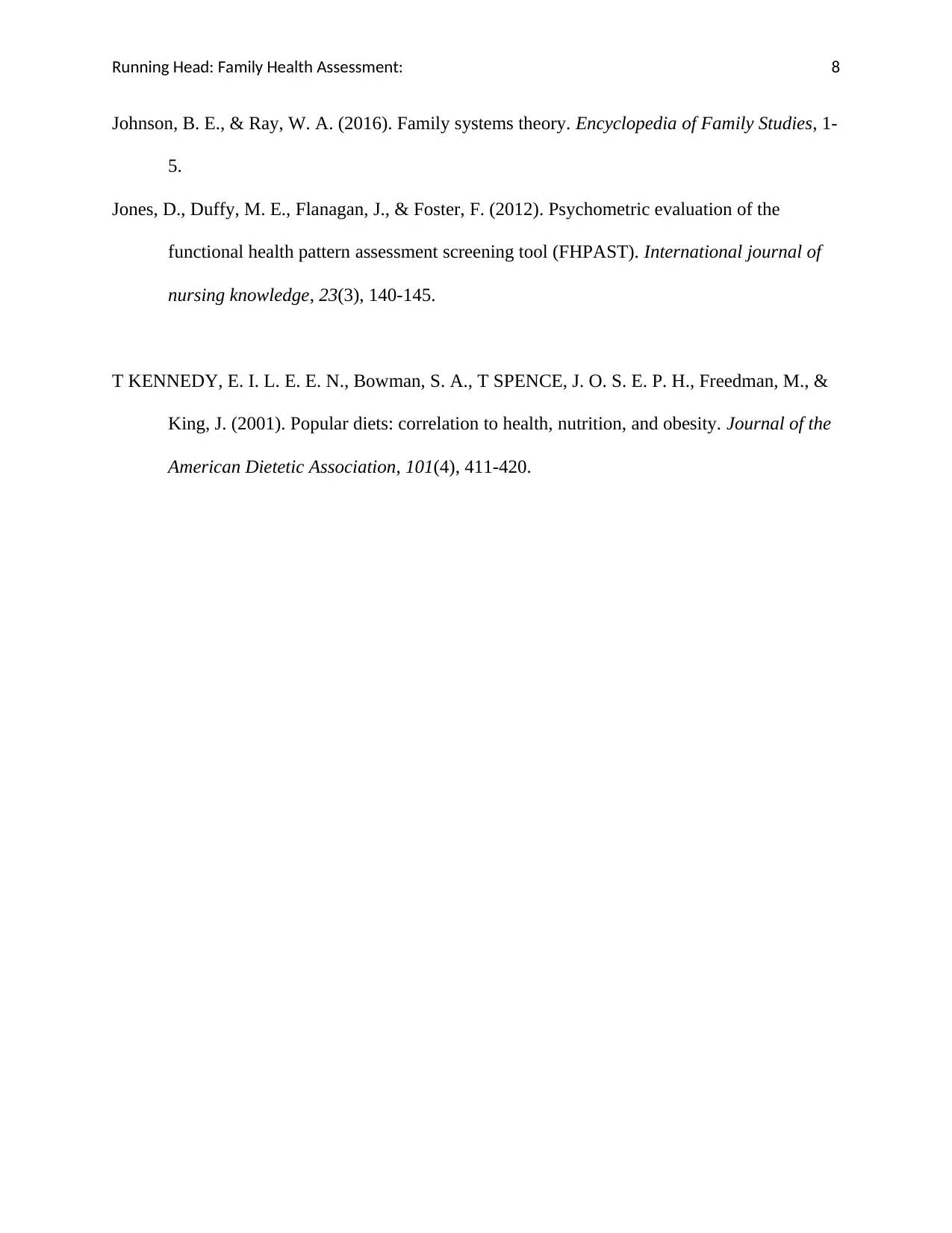
Running Head: Family Health Assessment: 8
Johnson, B. E., & Ray, W. A. (2016). Family systems theory. Encyclopedia of Family Studies, 1-
5.
Jones, D., Duffy, M. E., Flanagan, J., & Foster, F. (2012). Psychometric evaluation of the
functional health pattern assessment screening tool (FHPAST). International journal of
nursing knowledge, 23(3), 140-145.
T KENNEDY, E. I. L. E. E. N., Bowman, S. A., T SPENCE, J. O. S. E. P. H., Freedman, M., &
King, J. (2001). Popular diets: correlation to health, nutrition, and obesity. Journal of the
American Dietetic Association, 101(4), 411-420.
Johnson, B. E., & Ray, W. A. (2016). Family systems theory. Encyclopedia of Family Studies, 1-
5.
Jones, D., Duffy, M. E., Flanagan, J., & Foster, F. (2012). Psychometric evaluation of the
functional health pattern assessment screening tool (FHPAST). International journal of
nursing knowledge, 23(3), 140-145.
T KENNEDY, E. I. L. E. E. N., Bowman, S. A., T SPENCE, J. O. S. E. P. H., Freedman, M., &
King, J. (2001). Popular diets: correlation to health, nutrition, and obesity. Journal of the
American Dietetic Association, 101(4), 411-420.
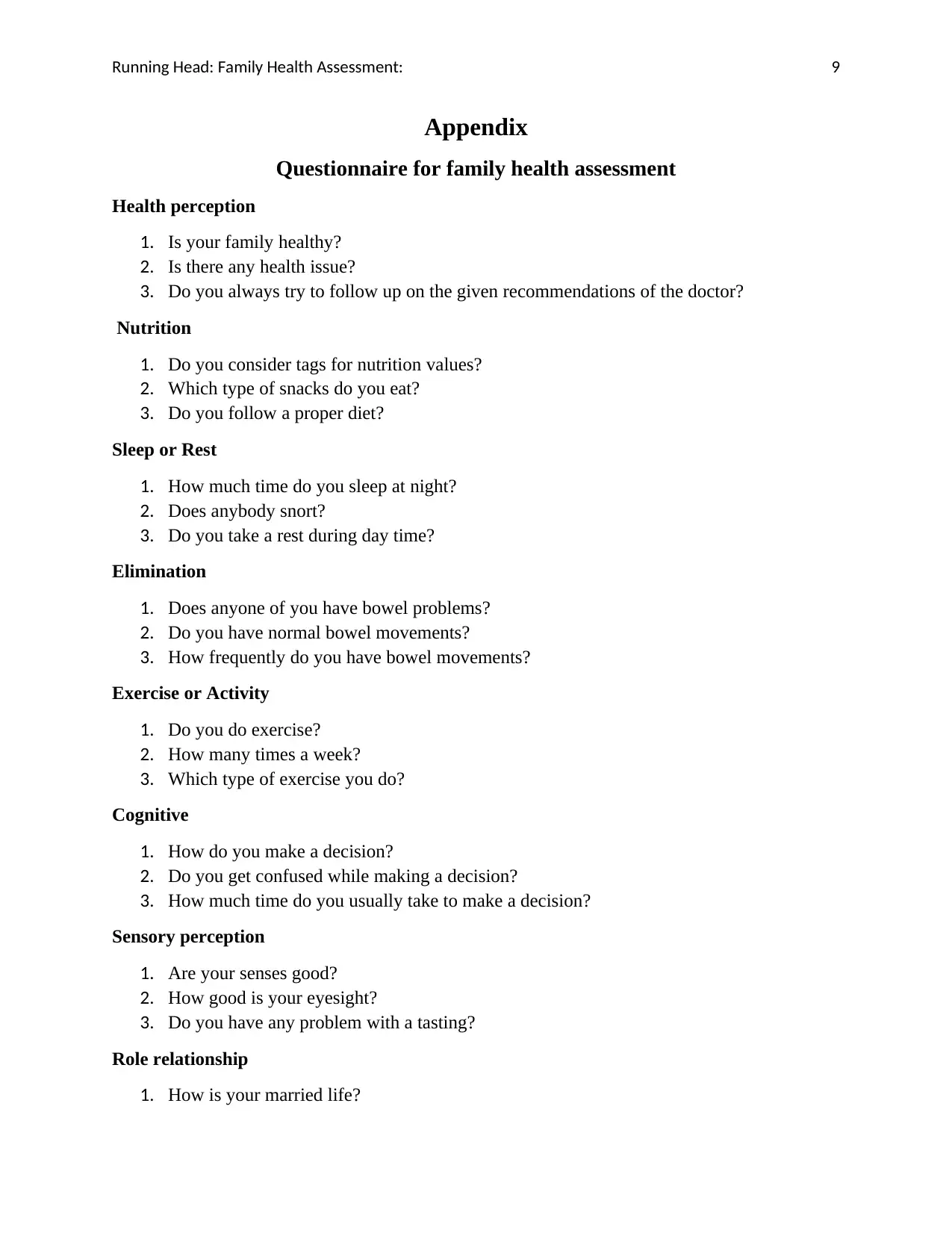
Running Head: Family Health Assessment: 9
Appendix
Questionnaire for family health assessment
Health perception
1. Is your family healthy?
2. Is there any health issue?
3. Do you always try to follow up on the given recommendations of the doctor?
Nutrition
1. Do you consider tags for nutrition values?
2. Which type of snacks do you eat?
3. Do you follow a proper diet?
Sleep or Rest
1. How much time do you sleep at night?
2. Does anybody snort?
3. Do you take a rest during day time?
Elimination
1. Does anyone of you have bowel problems?
2. Do you have normal bowel movements?
3. How frequently do you have bowel movements?
Exercise or Activity
1. Do you do exercise?
2. How many times a week?
3. Which type of exercise you do?
Cognitive
1. How do you make a decision?
2. Do you get confused while making a decision?
3. How much time do you usually take to make a decision?
Sensory perception
1. Are your senses good?
2. How good is your eyesight?
3. Do you have any problem with a tasting?
Role relationship
1. How is your married life?
Appendix
Questionnaire for family health assessment
Health perception
1. Is your family healthy?
2. Is there any health issue?
3. Do you always try to follow up on the given recommendations of the doctor?
Nutrition
1. Do you consider tags for nutrition values?
2. Which type of snacks do you eat?
3. Do you follow a proper diet?
Sleep or Rest
1. How much time do you sleep at night?
2. Does anybody snort?
3. Do you take a rest during day time?
Elimination
1. Does anyone of you have bowel problems?
2. Do you have normal bowel movements?
3. How frequently do you have bowel movements?
Exercise or Activity
1. Do you do exercise?
2. How many times a week?
3. Which type of exercise you do?
Cognitive
1. How do you make a decision?
2. Do you get confused while making a decision?
3. How much time do you usually take to make a decision?
Sensory perception
1. Are your senses good?
2. How good is your eyesight?
3. Do you have any problem with a tasting?
Role relationship
1. How is your married life?
⊘ This is a preview!⊘
Do you want full access?
Subscribe today to unlock all pages.

Trusted by 1+ million students worldwide
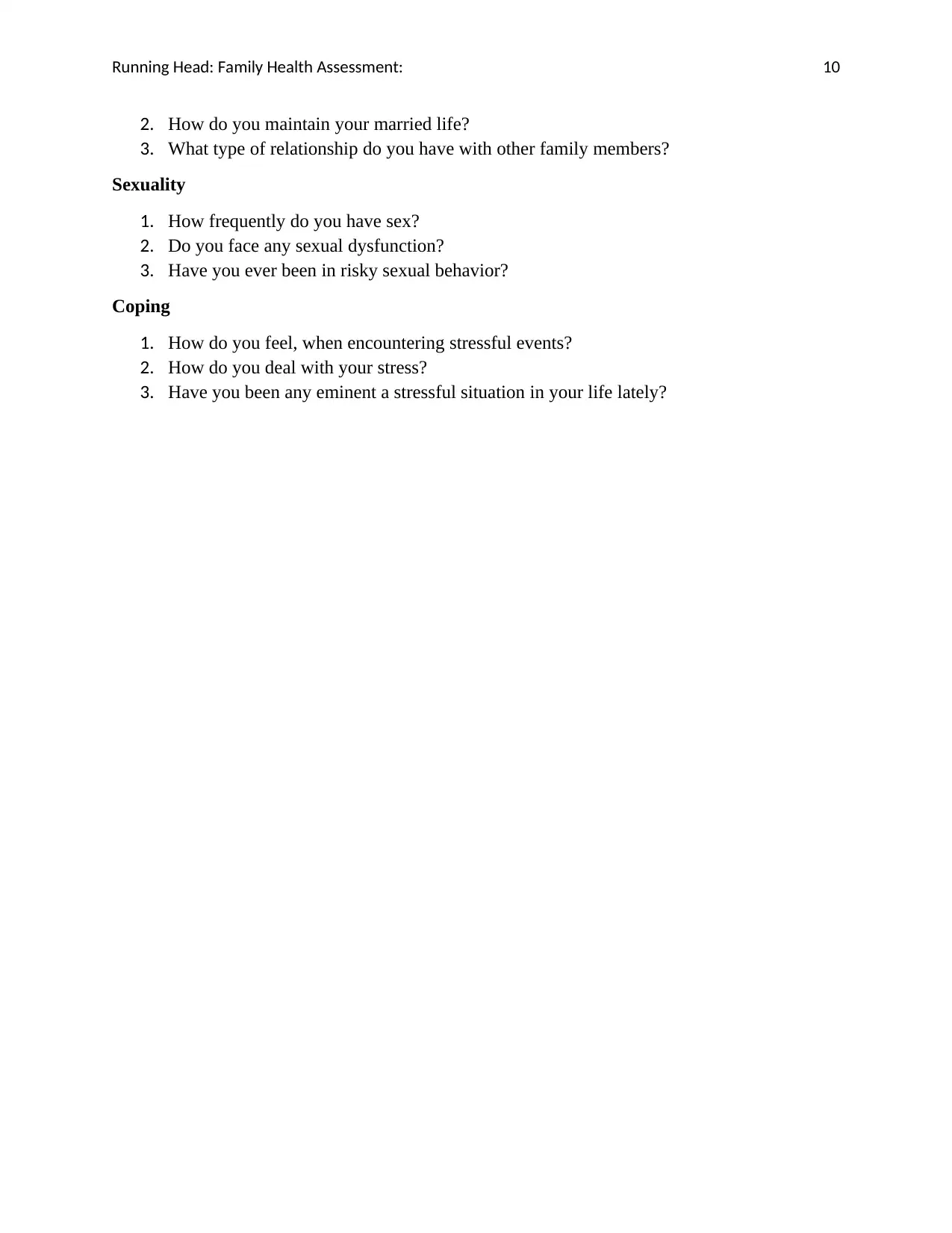
Running Head: Family Health Assessment: 10
2. How do you maintain your married life?
3. What type of relationship do you have with other family members?
Sexuality
1. How frequently do you have sex?
2. Do you face any sexual dysfunction?
3. Have you ever been in risky sexual behavior?
Coping
1. How do you feel, when encountering stressful events?
2. How do you deal with your stress?
3. Have you been any eminent a stressful situation in your life lately?
2. How do you maintain your married life?
3. What type of relationship do you have with other family members?
Sexuality
1. How frequently do you have sex?
2. Do you face any sexual dysfunction?
3. Have you ever been in risky sexual behavior?
Coping
1. How do you feel, when encountering stressful events?
2. How do you deal with your stress?
3. Have you been any eminent a stressful situation in your life lately?
1 out of 10
Related Documents
Your All-in-One AI-Powered Toolkit for Academic Success.
+13062052269
info@desklib.com
Available 24*7 on WhatsApp / Email
![[object Object]](/_next/static/media/star-bottom.7253800d.svg)
Unlock your academic potential
Copyright © 2020–2025 A2Z Services. All Rights Reserved. Developed and managed by ZUCOL.





